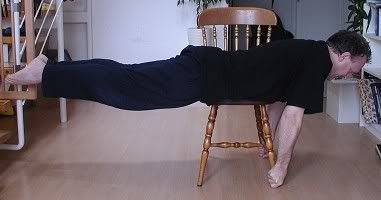The Firm had fully taken over the resort hotel by Friday night. Dance music flooded the foyer, and bodies bobbed in colored, dim lighting. The Firm is a wealthy and powerful multinational (about as multinational as they get; with offices in almost every country of the world), and when it takes its personnel out of town for all-company functions, it does it in a big way.
After these several hundred souls had been crammed into an
auditorium as the captive audience of endless presentations for a large part of the day (and cursing the fiends who created Power Point), and then wined and dined at The
Firm's expense, everyone was releasing their tensions (not only of the day, but accumulated over months!) in the massive party, as the free booze flowed.
In a big way: the entire cavernous hotel lobby had been redecorated and
re-lit. A stage had been built on one end for the featured band. A wooden dance floor had been constructed to protect the permanent floor.
The party had a 60s theme. Lots of mini dresses and mini skirts. Multi-colored polka dots everywhere.
Wandering among the crowd with my glass of dry red, I stumbled upon the encampment of my colleagues. The lawyers in this firm tend to be clique-
ish, and don't mix much with the other professionals. They had commandeered several long couches and long tables next to a large-screen TV running with the sound muted. It was showing a war movie, and no one was paying much attention. Many of the combatants were wearing those unmistakable
Afghan hats.
As I approached them, he saw me and made eye contact. He (let's call him Peter) jumped up from the couch and came to meet me before I got very close to the rest of them. Peter had an urgent expression on his face.
"I want to ask you something," he said, leaning close to compensate for the loud music.
"My God! That sounds awfully serious," I half joked.
"Oh, it's not about you. It's about me."
"That still sounds serious."
You see: Peter and I aren't close in any way. We see each other at the office, and he lingers a minute or two to talk when he has to come consult with me about a document of his I'm editing, but the fact that I'm not a lawyer, and that I'm not Hungarian, and that I'm twice his age, and countless other factors, make it a distant (if friendly) relationship. I recall when he started at The Firm several years back, I noted that he was a strikingly handsome man, as far as I am a judge of masculine beauty. And his soulful eyes told me that he was likely sensitive and passionate. At any rate, it came as a surprise that he wanted to pour his heart out to me. And I could feel in my bones that's what was coming.
He looked into my eyes, almost pleadingly, and asked, "What do you do when a woman breaks your heart?"
I paused, aware of his eyes fixed on me. He really wanted an answer. Not a time to be flippant or dismissive. I thought, as well as one can in an environment of throbbing pop music, and a million
LCDs depicting a night battle in rugged hills, complete with flashing explosions (certain clues told me what was being depicted was the
siege of
Tora Bora).
There was no doubt Peter had picked the right person to ask. My second wife shattered my heart so thoroughly, it took me years to gather all the pieces together again. And it took the flames evoked in that broken heart by my current wife and the children she bore me (not to mention being reunited with my first child) to fuse it back into one piece.
Is that why he came to me? Had someone in The Firm told him about my history? (Not likely, since I don't really talk about such things at work.) Or was it just that I'm old enough to be "fatherly" to him?
I knew what he wanted to know was how one got over it. And I didn't really have an answer for that. My experience was that the only thing that really made a difference was time.
He must have read my mind.
"I guess," he said, "It's just a matter of time."
I nodded. He nodded, sighed, looked down at the floor, his shoulders drooping.
"Who broke your heart?" I regretted the indiscretion as soon as I'd said it.
"I think you know."
"No, I don't."
Within a few seconds I reviewed memories of people I'd seen him
socializing with. Two candidates came to mind. I'm not innocent enough to be shocked, but I was surprised, since one is married and the other has a very significant other.
He was about to turn and walk away when something occurred to me.
"There is one more thing," I said.
His eyes opened a bit wider.
"I know you probably don't feel like it now, but once you get over the initial hurt, you have to forgive her."
He didn't say anything. He just continued looking at me. He was trying to understand.
"If you don't forgive her, it will eat you up from inside. It can destroy you."
He was still silent; still watching. I decided I'd gone this far, I may as well go a little farther. The soldiers on the screen had gotten the signal to advance; scores of men with weapons running up the side of a mountain.
"My father never found it in himself to forgive my mother after she left him. I watched what it did to him. I think it slowly destroyed him. He never really got it together again. He never really learned to trust anyone or love anyone again."
Peter was nodding and his eyes had that distant look of internal reflection.
We stood there a bit longer, our drinks in our hands. On the screen, it was the morning after the battle. Some middle-aged soldiers with CIA written all over them (metaphorically that is) were combing a rubble-and-body-strewn cave for useful intelligence. One of them freaked out when he found a dialysis machine.
"That's about all the wisdom I can muster at this point," I said.
He smiled. "Thanks," he said.
He drifted back to his pals, and I walked over to one of the lawyers who's closer to my age, cocked my head in the direction of the dance floor and said, "Let's go dance." We left the legal eagles and the war in southern Asia behind, to lose ourselves in the rhythms of hundreds of bodies forgetting the pressures and the heartbreaks of daily life on this planet. Dance. Forgive. Learn to love again.








